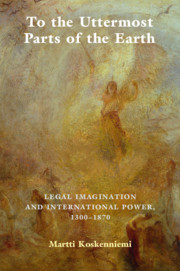Book contents
- To the Uttermost Parts of the Earth
- To the Uttermost Parts of the Earth
- Copyright page
- Dedication
- Contents
- Acknowledgements
- Introduction
- Part I Towards the Rule of Law
- Part II France: Law, Sovereignty and Revolution
- Part III Britain: Laws and Markets
- Part IV Germany: Law, Government, Freedom
- 11 A Science of State-Machines
- 12 The End of Natural Law
- Conclusion and Epilogue
- Bibliography
- Index
11 - A Science of State-Machines
Ius naturae et gentium As a German Discipline c. 1500–1758
from Part IV - Germany: Law, Government, Freedom
Published online by Cambridge University Press: 05 August 2021
- To the Uttermost Parts of the Earth
- To the Uttermost Parts of the Earth
- Copyright page
- Dedication
- Contents
- Acknowledgements
- Introduction
- Part I Towards the Rule of Law
- Part II France: Law, Sovereignty and Revolution
- Part III Britain: Laws and Markets
- Part IV Germany: Law, Government, Freedom
- 11 A Science of State-Machines
- 12 The End of Natural Law
- Conclusion and Epilogue
- Bibliography
- Index
Summary
From the 16th century onwards, the German academy offered a home for the most intensive reflection about modern statehood. German professors used the vocabulary of ius naturae et gentium (law of nature and of nations) to adapt the insights they had applied to the constitution of the Roman–German Empire to the world of European diplomacy in general. Statehood, it was suggested, was an instrument for the community to govern its affairs in a rational way. The notion of the Christian paterfamilias was given a secular meaning in the theory of the ruler as the manager of the state-machine that was to be operated under the instructions produced by a rational science of natural law. The fact that the practice of 18th-century diplomacy was hard to confine within the strictures of natural law theory, gave legal doctrine an often sceptical tone that pushed it ever closer to raison d’état.
Keywords
- Type
- Chapter
- Information
- To the Uttermost Parts of the EarthLegal Imagination and International Power 1300–1870, pp. 797 - 872Publisher: Cambridge University PressPrint publication year: 2021

